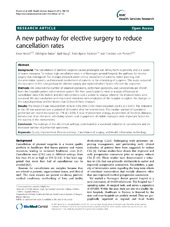| dc.contributor.author | Hovlid, Einar | en_US |
| dc.contributor.author | Bukve, Oddbjørn | en_US |
| dc.contributor.author | Haug, Kjell | en_US |
| dc.contributor.author | Aslaksen, Aslak | en_US |
| dc.contributor.author | Plessen, Christian von | en_US |
| dc.date.accessioned | 2013-05-14T10:14:55Z | |
| dc.date.available | 2013-05-14T10:14:55Z | |
| dc.date.issued | 2012-06-11 | eng |
| dc.Published | BMC Health Services Research 2012, 12:154 | eng |
| dc.identifier.issn | 1472-6963 | |
| dc.identifier.uri | https://hdl.handle.net/1956/6604 | |
| dc.description.abstract | Background: The cancellation of planned surgeries causes prolonged wait times, harm to patients, and is a waste of scarce resources. To reduce high cancellation rates in a Norwegian general hospital, the pathway for elective surgery was redesigned. The changes included earlier clinical assessment of patients, better planning and documentation systems, and increased involvement of patients in the scheduling of surgeries. This study evaluated the outcomes of this new pathway for elective surgery and explored which factors affected the outcomes. Methods: We collected the number of planned operations, performed operations, and cancellations per month from the hospital’s patient administrative system. We then used Student's t-test to analyze differences in cancellation rates (CRs) before and after interventions and a u-chart to analyze whether the improvements were sustained. We also conducted semi-structured interviews with employees of the hospital to explore the changes in the surgical pathway and the factors that facilitated these changes. Results: The mean CR was reduced from 8.5% to 4.9% (95% CI for mean reduction 2.6-4.5, p < 0.001). The reduction in the CR was sustained over a period of 26 months after the interventions. The median number of operations performed per month increased by 17% (p = 0.04). A clear improvement strategy, involvement of frontline clinicians, introduction of an electronic scheduling system, and engagement of middle managers were important factors for the success of the interventions. Conclusion: The redesign of the old clinical pathway contributed to a sustained reduction in cancellations and an increased number of performed operations. | en_US |
| dc.language.iso | eng | eng |
| dc.publisher | BioMed Central | eng |
| dc.relation.ispartof | <a href="http://hdl.handle.net/1956/7173" target="blank">Reducing cancellations of planned operations</a> | eng |
| dc.rights | Attribution CC BY | eng |
| dc.rights.uri | http://creativecommons.org/licenses/by/2.0/ | eng |
| dc.subject | Quality improvement | eng |
| dc.subject | Process redesign | eng |
| dc.subject | Cancellation of surgery | eng |
| dc.subject | Health information technology | eng |
| dc.title | A new pathway for elective surgery to reduce cancellation rates | en_US |
| dc.type | Peer reviewed | |
| dc.type | Journal article | |
| dc.description.version | publishedVersion | en_US |
| dc.rights.holder | Copyright 2012 Hovlid et al.; licensee BioMed Central Ltd. | |
| dc.identifier.doi | https://doi.org/10.1186/1472-6963-12-154 | |
| dc.identifier.cristin | 929036 | |
| dc.source.journal | BMC Health Services Research | |
| dc.source.40 | 12 | |
| dc.source.14 | 154 | |

